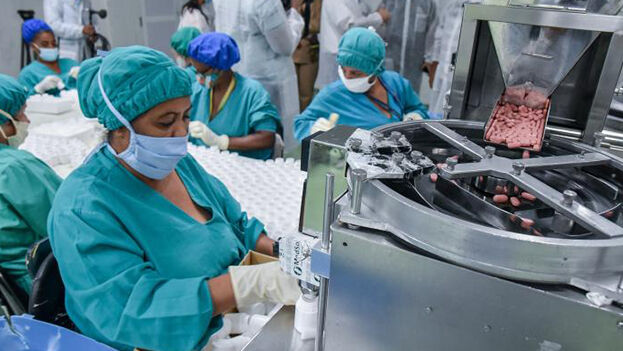
![]() 14ymedio, Havana, 2 May 2023 — The state business group BioCubaFarma has reactivated some drug production lines that had disappeared for months in the Island’s pharmacies, but its directors recognize that the measure will not be enough to meet “all the needs” of the population.
14ymedio, Havana, 2 May 2023 — The state business group BioCubaFarma has reactivated some drug production lines that had disappeared for months in the Island’s pharmacies, but its directors recognize that the measure will not be enough to meet “all the needs” of the population.
The shortage of medicines is attributed to the lack of raw materials, the company’s Director of Operations and Technology, Rita María García, told the state newspaper Granma on Monday. On the one hand, the Government does not have enough financial liquidity to buy the finished supplies or drugs and, on the other, there are also problems in the supply of packaging in the international market, he explained.
After months of a “very complex” situation, García assured that the state plant — which is allocated 60% of the production of basic medicines at the national level — has managed to reactivate some drug production lines in high-demand among the population with the arrival of inputs purchased by the Government and other “managements,” without specifying whether they are donations.
Among the drugs that will be manufactured again are the injectables of aminophylline, labetalol, fenoterol and morphine of 10 and 20 milligrams (mg), of wide hospital use for patients in intensive care. The laboratories dedicated to the manufacture of these drugs were paralyzed for almost four months because they did not have containers — such as ampules, plungers or cartridges — due to the shortage of glass.
“This brought with it deficiencies in over 10 products needed for patients in serious condition. Once these packaging containers arrived, production was restored, and the products are gradually coming out for hospital distribution,” the executive told the official newspaper.
The scenario is much more complicated for cancer patients, for whom “at the moment there is a significant deficit” of medicines, mainly cytostatics, despite the alarming increase in cases in recent months. The director was clear: “There will be no presence” of paclitaxel, cisplatin and oxaliplatin.
This newspaper collected the testimony of several people who, after being diagnosed with cancer, could not register for treatment at the National Institute of Oncology and Radiobiology in Havana. The response they received from the doctors is that they are attending only to “patients already registered, and new registrations are not being accepted due to lack of medicines.”
García acknowledged that the business group has not had the capacity to supply the medicines, and no improvement is expected in the short term. The official warns that the problem of deliveries will continue “for the moment.”
The entry of inputs gives a slight boost to the production of some controlled chemicals, such as the diuretic drug hydrochlorothiazide, which since last March is being manufactured again and delivered to hospitals. However, the official said that “the population still does not feel it, because it’s a drug that has been missing for many months.”
The business group has enough raw material to guarantee the supply of hydrochlorothiazide until August. For the rest of the year the panorama is uncertain, but García assured that “actions” are being carried out to guarantee supplies before the available ones are exhausted.
The production line for nifedipine (antihypertensive), warfarin (anticoagulant) and clonazepam (anxiolytic) has also been reactivated. In the case of medicines for diabetic patients, the production of glibenclamide and metformin has resumed. The latter, however, will have low coverage because an excipient is missing that is difficult to import.
The BioCubaFarma directive announced that the availability in pharmacies of enalapril, used for hypertension, a condition with high prevalence in Cuba, will continue to be limited in the coming months.
Similarly, the shortage will continue in deliveries of allopurinol, which is used in patients with uric acid deficiencies, amiodarone for heart problems, omeprazole for heartburn, and the antipsychotic haloperidol. García said that in the case of the last two drugs they cannot be produced due to breakage of the equipment, but that the replacement parts will arrive soon.
In his report to Granma, he pointed out that there will be “stable” deliveries in the next four months of the antibiotics cephalexin, cefixime and ciprofloxacin, although their continuity depends on the arrival of raw material from a supplier who has not been able to dispatch a container ship due to lack of availability. For the rest of the drugs in this range there are no supplies, nor is it known when they will be able to reach the Island, he said.
After a long litany of regrets about the lack of medicines, García assured the official newspaper that BioCubaFarma’s income has been maintained in large part thanks to the sale of “business models” and patents, since “in principle” they cannot export the drugs that are needed in the country.
Translated by Regina Anavy
_______________
COLLABORATE WITH OUR WORK: The 14ymedio team is committed to practicing serious journalism that reflects Cuba’s reality in all its depth. Thank you for joining us on this long journey. We invite you to continue supporting us by becoming a member of 14ymedio now. Together we can continue transforming journalism in Cuba.
